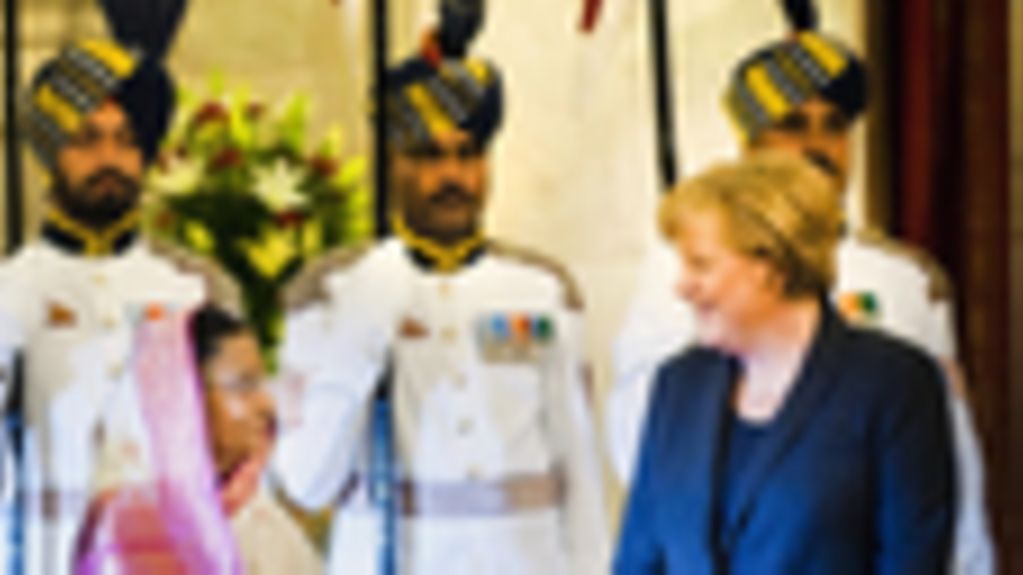in New Delhi

Chancellor Merkel receives the Nehru Award for International Understanding
Photo: REGIERUNGonline/Kugler
Madam President,
Mr Vice-President,
Prime Minister,
President of the Indian Council for Cultural Relations,
Excellencies,
Ladies and gentlemen,
Receiving the Nehru Award for International Understanding is truly a great honour. I’d like to sincerely thank you for this gesture of appreciation and trust.
I regard this Award as confirmation that our two countries have travelled along the right road together. India and the Federal Republic of Germany established diplomatic relations in 1951. Today we can look back on these 60 years of diplomatic relations with gratitude and indeed some pride.
However, the Nehru Award not only stresses the mutual trust we’ve already built up. It also links us as partners who are looking to the future. It’s an incentive to combine forces to master common challenges, for example the dramatic changes taking place in North Africa and in some Arab countries. People there are struggling to bring about a political transition which will allow them to gain freedom and self-determination.
It is becoming very clear that those who take international understanding seriously also have to shoulder responsibility beyond traditional international diplomacy. We have to provide concrete support to those seeking to make a fresh start – through the many different forms of international development cooperation, through concrete vocational training measures, as well as through assistance in creating jobs. Our two countries can learn a lot from each other in this sphere.
But that’s not enough. The challenges facing us in our globalized world are truly manifold. For instance, we have to look very closely to see whether and where safe havens for terrorists are emerging and take decisive action to contain them. That is the purpose of the international community’s mission in Afghanistan, for which Germany has provided almost 5,000 soldiers. India is one of Afghanistan’s partner countries and it is seeking in many ways to stabilize this country and to guide it towards peace. We also know that states which are unable to combat organized crime or drug trafficking on their own need our joint support.
Furthermore, we have to keep up our efforts to prevent the proliferation of nuclear weapons. The critical situation in Iran has brought that home to us. It’s important that Germany and India use the UN Security Council to make it clear to Iran that it must reconsider its position. Iran must dispel the doubts concerning the peaceful nature of its nuclear programme.
In the spirit of Nehru, after whom the Award I am receiving today is named, it’s important we focus today on the many global issues. These include climate protection, the global supply of food, access to water or protection from disease. If we want to shape the global order – and Germany and India agree on this – then we need functioning international forms of cooperation. We are working together closely within the G20, which has learned the right lessons from the global economic and the financial crises.
At the same time, we have to ensure – here, too, India and Germany are working together very closely – that our structures and the international structures are geared to meet the challenges we face today. We therefore agree that we urgently need to reform the UN Security Council, for it no longer reflects the real balance of power and the global situation in the 21st century.
If this reform is to be successful, it’s crucial that relations between Germany and India be close and amicable. We will therefore continue to work towards expanding the exchange between our two countries.
The first intergovernmental consultations between Germany and India – a new dimension of our strategic partnership – took place today. We will not only strengthen the political and economic but also the academic, social and cultural ties between our countries.
I’m therefore delighted to be able to use the prize money for the Nehru Award to develop a scholarship programme. It is to make it possible for young Indians to complete a Master’s degree in Germany in the sphere of German and European law. This will give young people a chance to contribute to the friendly and intensive relations between our two countries.
Every concrete project of this kind brings our countries a little bit closer together. They enable people to get to know each other better. And that’s the very task we have to tackle: learning from each other in a globalized world, talking to each other and finding solutions by adhering to our principles but also being prepared to compromise. That’s what brings the world together. A close, reliable and friendly partnership between Germany and India is a good basis for this. I therefore believe I have an obligation to further this partnership within the scope of my political work.
Thank you once more for bestowing this distinguished Award on me today.